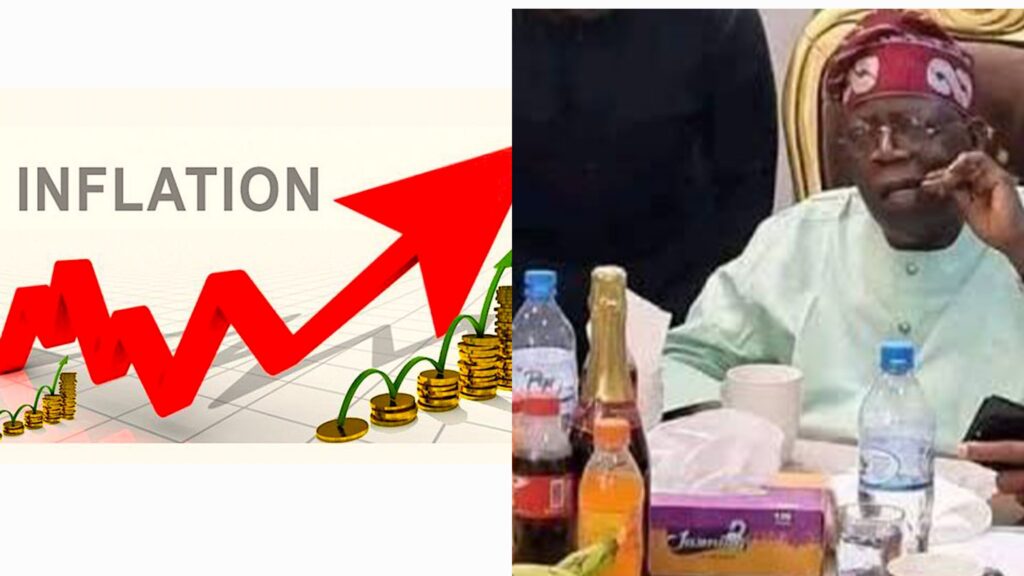
Nigeria’s headline inflation rate in September 2024 rose to 32.70%, up from 32.15% in August 2024, marking a 0.55% increase month-on-month, according to the National Bureau of Statistics (NBS).
According to NBS’s Consumer Price Index (CPI) report, inflation during the month was propelled by increases in transportation costs and food prices.
This is coming on the heels of increases in petrol prices by state-run oil company NNPC Limited since early September.
On a year-on-year basis, the rate was 5.98 percentage points higher than the 26.72% recorded in September 2023, indicating a significant increase in inflation over the past year.
Additionally, on a month-on-month basis, the headline inflation rate in September 2024 was 2.52%, 0.30% higher than the 2.22% recorded in August 2024. This indicates that the average price level increased at a faster rate in September compared to August 2024.
Food Inflation
The food inflation rate in September 2024 was 37.77% year-on-year, marking an increase of 7.13 percentage points from the 30.64% recorded in September 2023.
On a month-on-month basis, the food inflation rate in September 2024 stood at 2.64%, reflecting a 0.27% rise compared to the 2.37% recorded in August 2024.
This increase can be linked to the rising prices of items such as beer (local and foreign) in the tobacco class, vegetable oil, groundnut oil, and palm oil in the oil and fats class, as well as beef, gizzard, dried beef in the meat class, and products like Lipton, Milo, and Bournvita.
The average annual food inflation rate for the twelve months ending in September 2024 was 37.53%, a 11.88 percentage point increase from the 25.65% recorded in September 2023.
Core Inflation
Core inflation, which excludes volatile agricultural products and energy prices, stood at 27.43% year-on-year in September 2024, an increase of 5.59 percentage points compared to 21.84% in September 2023.
The largest price increases were seen in items such as rent (actual and imputed rentals for housing), intercity bus journeys, taxi fares (under passenger transport by road), meals at local restaurants (accommodation services), and others.
On a month-on-month basis, the core inflation rate was 2.10% in September 2024, down by 0.17% from the 2.27% recorded in August 2024.
Rural and Urban inflation in September
The urban inflation rate in September 2024 was 2.67%, reflecting a 0.28 percentage point increase compared to 2.39% in August 2024.
Meanwhile, the rural inflation rate stood at 2.39% in September 2024, up by 0.33 percentage points from 2.06% recorded in August 2024.
Nigeria economy crisis
Nigeria is facing its worst economic crisis in decades, with skyrocketing inflation, the national currency in free-fall and millions of people struggling to buy food. Only two years ago Africa’s biggest economy, Nigeria is projected to drop to fourth place this year.
The pain is widespread. Unions strike to protest salaries of around $20 a month. People die in stampedes, desperate for free sacks of rice. Hospitals are overrun with women wracked by spasms from calcium deficiencies.
Although President Bola Tinubu increased the minimum wage — after strike action and months-long negotiations with labour unions — from ₦30,000 to ₦70,000, his government has increased spending for officials at a time of nationwide starvation.
For workers earning the new ₦70,000, or $43 per month minimum wage, capricious inflation and naira value have inflicted too much damage for the changes to make any difference in their lives.
The crisis is largely believed to be rooted in two major changes implemented by Tinubu, elected 17 months ago: the partial removal of fuel subsidies and the floating of the currency, which together have caused major price rises.
Over a year after Tinubu declared end to fuel subsidy, the fuel price which had been hiked a few times during his first year in office, officially hit the ₦1,000 mark last week, as oil marketers including state-run Nigerian National Petroleum Corporation (NNPC) Limited, adjusted their pumps in Abuja to ₦1,030 per litre and those in Lagos State did to ₦998, compounding the woes of the citizens who power their vehicles, and generating sets with petrol, no thanks to decades-long epileptic electricity supply.
This follows after the NNPC Limited withdrew from being middlemen between the oil marketers and the Aliko Dangote-owned refinery for the supply of fuel.
Dangote had also urged the president to fully hand off fuel subsidy.
In recent weeks, the nation has suffered an acute fuel scarcity that led the few stations with fuel to sell at exorbitant prices above ₦1,100 per litre while black market prices exceeded ₦1,300.
A nation of entrepreneurs, Nigeria’s more than 200 million citizens are skilled at managing in tough circumstances, without the services states usually provide. They generate their own electricity and source their own water. They take up arms and defend their communities when the armed forces cannot. They negotiate with armed kidnappers when family members are abducted.
But right now, their resourcefulness is being stretched to the limit.
In August, Amnesty International accused Nigerian security forces of killing at least 21 protesters during a week of economic hardship protests.
Police and other security agencies clamped down on protests after thousands of people joined rallies against government policies and the high cost of living from August 1st to 10th.
Security forces denied responsibility for deaths during the protests.
